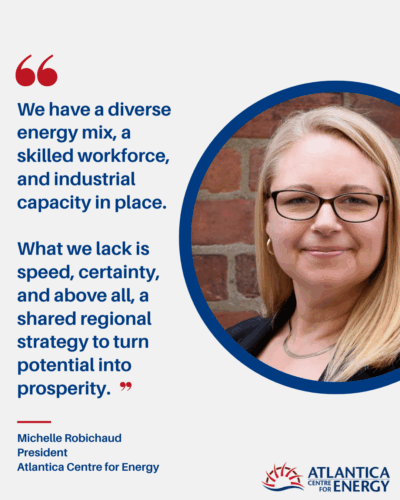Commentary by Michelle Robichaud, President
Atlantic Canada is often left out of national energy conversations—but that’s a costly oversight. The region is uniquely positioned to lead a new wave of nation-building projects for Canada.
The economic tide is turning is Canada as governments are getting serious about the need to build faster. But, due to investment uncertainty and a lack of public support for building new energy projects, the ship has run aground.
For at least a decade, the energy sector has shouted that increasingly slow and uncertain pathways to develop projects are hampering investments.
Remember, the private sector builds big projects, not governments.
These realities have stymied investment and economic growth in Atlantic Canada. The question is: will Atlantic Canada seize this moment—or let it drift by?
We are not short on opportunity. The region is rich in renewable resources—hydro, wind, forest biomass, clean fuels, marine bioresources, and nuclear. We have a diverse energy mix, a skilled workforce, and industrial capacity in place. What we lack is speed, certainty, and above all, a shared regional strategy to turn potential into prosperity.
The reality is that while a single Atlantic province could anchor a nation building project, it needs the other provinces to bring it to fruition. The projects of national interest being considered across the country are not just about individual jurisdictions—they are about securing a long-term national advantage. For Atlantic Canada to join that list, we need to act as a region. That means aligning on a common vision, identifying shared priorities, and presenting a united front in Ottawa.
This is especially true for energy. Energy is the hidden foundation of Atlantic Canada’s competitiveness—essential to everything from traditional industries like forestry and agriculture, to emerging opportunities in clean fuels, and electrified manufacturing.
Consider the marine economy; ocean sectors are being transformed by the same global forces shaping energy—decarbonization, digitalization, and demands for sustainable inputs. Clean fuels like hydrogen and ammonia are critical to decarbonizing marine shipping. Biofuels and marine bioproducts have export potential. Electrification of port infrastructure can reduce emissions and boost trade competitiveness.
These opportunities don’t exist in silos.

Our energy strategy is our industrial strategy. And our industrial strategy must be regional.
Global investors don’t see individual provinces like New Brunswick or Prince Edward Island, they know about Atlantic Canada, as a region.
Improving investment certainty requires politicians to recognize that protectionism is a barrier to growth. When other provinces grow, the whole region benefits, such as offshore oil developments primarily benefits St. John’s there are huge spin-offs impacting Halifax too.
To gain public support, we need governments and utilities to have open discussions with the public about the economic and energy challenges the region faces today. Too often, governments announce solutions before clearly communicating the problem. Unfortunately, all this does is erode public trust and create resistance to necessary infrastructure. Instead, we must begin with honest conversations—grounded in facts—about what kind of energy future we want to build, and what it will take to get there.
Take for example, talk of building a new pipeline from Quebec into New Brunswick. What problem is this solving? Does the public understand how it could improve energy security, support new renewable energy development, facilitate economic reconciliation with First Nations and attract industry to improve the province’s overall economic situation? Or does the public just see a pipeline full of fossil fuels that may pass through their backyard?
At the Atlantica Centre for Energy, we reflect the needs of today’s industry while preparing for tomorrow’s. Industry is not asking for handouts—it’s asking for certainty. Clear policies. Streamlined regulations. A regional platform to build at scale. And, they are willing to do the work to build support from the public to take on these generational investments.
The federal government’s new framework for Projects of National Interest is a rare opening. But Ottawa won’t pick Atlantic projects unless we pick them first—together.
The truth is the Atlantic provinces do not need the federal government to approve any one nation-building project in the region. There are several solutions the private sector can invest in if there is public support and regulatory changes to improve confidence in making long-term investments.
This is our chance to chart a shared course—and set Atlantic Canada sailing toward a clean energy future.
ABOUT THE ATLANTICA CENTRE FOR ENERGY
Atlantica Centre for Energy provides a unique meeting ground for industry, government, the education and research sectors, and the community at large to foster partnerships and proactively engage in energy-related issues. As the voice for energy in the region, the Centre’s membership represents some of the largest employers, energy producers, distributors, and consumers in the region.
Media Contact:
Michelle Robichaud, President
Atlantica Centre for Energy
Email: Michelle.Robichaud@AtlanticaEnergy.org
Phone: 506-636-1110

